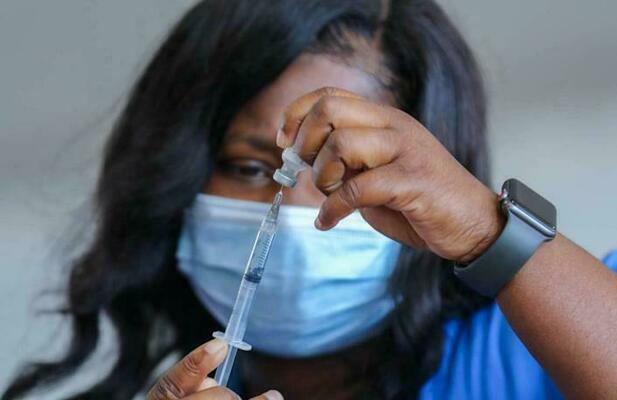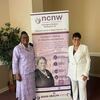Should Vaccinated SC Residents Wear Masks As Delta Variant Spreads? What Experts Say
 Naomi Frazier, a nurse with DHEC, draws vaccinations at a mass vaccination site set up by FEMA at the Columbia Place Mall in Columbia.
Naomi Frazier, a nurse with DHEC, draws vaccinations at a mass vaccination site set up by FEMA at the Columbia Place Mall in Columbia.
This was supposed to be America’s post-pandemic summer. “A summer of freedom. A summer of joy,” as the Biden administration recently put it.
But fears of another COVID-19 surge are growing in South Carolina and across the United States as the highly infectious Delta variant, first discovered in India late last year, begins to rapidly circulate among unvaccinated residents.
“We’re not learning from what other people have seen. It just never fails,” said Dr. Helmut Albrecht, medical director of the Center for Infectious Diseases Research and Policy at Prisma Health and the University of South Carolina.
Delta is the pandemic’s latest curveball, and public health authorities are pleading with unvaccinated people to get a shot.
Here’s everything you need to know about the Delta variant in South Carolina.
Should fully vaccinated residents wear masks again?
The World Health Organization recently recommended that fully vaccinated people wear face masks and practice social distancing due to the Delta variant’s spread. (The Los Angeles County Department of Public Health issued a similar recommendation on June 28.)
The Centers for Disease Control and Prevention, though, is sticking with its own guidance on the matter. The CDC rescinded most of its mask recommendations for fully vaccinated residents in May.
The S.C. Department of Health and Environmental Control is following the CDC’s lead and has not changed its mask guidance, said Dr. Jonathan Knoche, a medical consultant at DHEC.
Albrecht, of Prisma Health and USC, argued that the onus should now be on unvaccinated people, not fully vaccinated residents, to help protect the community at large.
At this point, Albrecht said, he’s in favor of vaccine passports at events like concerts, and vaccine mandates for health care employees, and is opposed to new guidelines telling inoculated people to wear masks again.
“It’s not necessary for them,” he said.
Michael Sweat, director of the COVID-19 Epidemiology Intelligence Project at the Medical University of South Carolina in Charleston, said he also agrees with the CDC’s decision on masks.
“The vaccine really does work well against this variant. ... There is a risk you’re going to catch it and get sick, but you’re not likely to get a very serious infection,” Sweat said.
People are also generally fed up with masks, he said.
If the CDC opted to issue new mask guidance now, it might “blow the opportunity” to successfully do so again during a major Delta surge later this year.
“I would wait to pull that trigger until it’s needed, because there is a huge resistance,” Sweat said.
Fully vaccinated people, he added, can still individually decide that they want to wear masks in public. Sweat wears his mask when in crowded spaces, he said.
Do experts think a COVID-19 spike is imminent in South Carolina?
An uptick in Delta cases will “undoubtedly” occur in the Palmetto State after the Fourth of July, Albrecht said.
“It would be surprising if we didn’t” have a spike, he said. Delta is “significantly more infectious and therefore is a real threat to the unvaccinated.”
Sweat also expects an increase in cases, which is a “huge concern,” but stressed that health care systems and hospitals will probably not be overwhelmed.
MUSC has estimated that 64% of the state’s population is immune to the coronavirus, SARS-CoV-2, either through natural infection or inoculation, Sweat said.
That means a significant number of people are unlikely to be hospitalized for COVID-19, he said. (That prediction could change, he said, if scientists discover that coronavirus reinfections are more common with Delta.)
COVID-19 spread remains relatively low in the state right now, Sweat added. It’s unclear when Delta might cause a surge, he said.
Some states, though, are already reporting a new wave of cases attributed to Delta’s spread. Missouri, for example, as of Friday had recorded a 55% increase in cases over the past two weeks.
Missouri has fully vaccinated 39.2% of its entire population, according to a New York Times database. South Carolina has fully inoculated 38.8% of its population, the database shows.
How many Delta cases are in the state?
Knoche, the DHEC consultant, said the state agency as of June 28 had confirmed 10 Delta cases in South Carolina. That’s an increase of six infections from the week prior. (Knoche’s data reflect only cases sequenced at DHEC’s public health lab.)
About 5.2% of the variants of concern sequenced at the state lab over the past four weeks have been Delta, which is also known as B.1.617.2, Knoche told reporters Wednesday.
The true number of Delta cases in the state, though, is almost certainly greater than the 10 infections reported by DHEC. That’s because South Carolina has sequenced only a fraction of coronavirus cases reported in the Palmetto State since early last year — less than 1% of all infections, according to the CDC.
“We’re ... not sequencing enough, so it’s hard to tell exactly what’s going on in certain pockets,” Albrecht said.
How effective are vaccines against Delta?
Coronavirus vaccines are still highly protective against Delta. Fully inoculated residents should not worry about the new variant, Albrecht said.
A Public Health England study published May 22 found that two doses of the Pfizer-BioNTech vaccine were 88% effective against symptomatic cases of the Delta variant. In comparison, two doses of Pfizer’s vaccine were 93% effective against the Alpha variant, which was first discovered in the United Kingdom last year.
One dose of Pfizer’s vaccine, though, was only 33% effective against symptomatic Delta cases. That’s down from the 50% one-dose efficacy against Alpha, the health agency reported.
Moderna and Johnson & Johnson, meanwhile, recently announced that their vaccines also remain protective against Delta.
Why is Delta more dangerous than other variants?
Scientists estimate that Delta is 60% more transmissible than the Alpha variant.
Delta also appears to side-step part of the body’s vaccine-induced immune response, leading to a drop in efficacy for currently authorized inoculations.
“Information about the severity of the Delta variant strain is still being determined,” Knoche said.
What parts of the state could Delta hit hard?
Rural counties and neighborhoods with lower vaccination rates could face serious issues if Delta surges in South Carolina, Albrecht said.
(As an example, only 36% of residents 12 or older in rural Barnwell County have received at least one vaccine dose.)
But Sweat argued that outbreaks can occur anywhere and are somewhat unpredictable. He pointed to MUSC’s estimates that show some rural counties have a high percentage of residents who previously contracted the coronavirus. (MUSC estimates that 63% of Barnwell County’s population is immune to SARS-CoV-2, including via natural infection.)
The Greenville area and spots along the North Carolina border like Dillon County have historically had some of the state’s worst COVID-19 outbreaks since the pandemic began, Sweat said.
Are “breakthrough cases” more common with Delta?
Knoche noted that the Delta variant will likely become the dominant coronavirus strain in the United States in the coming weeks, meaning it will inevitably contribute to a larger share of breakthrough cases, given its increased prevalence.
Should unvaccinated people be worried about the new variant?
Yes. Experts say that Delta is extremely dangerous for residents who have yet to get a dose.
“The current best protection against all COVID variants is to be vaccinated,” Knoche said.
Should parents be worried about Delta infections among kids?
Delta will undoubtedly spread among children 12 or younger, Albrecht said.
Mask use will be crucial for that age group, Albrecht said, even if mask mandates are unlikely in K-12 school districts, given Gov. Henry McMaster’s recent order banning those requirements.
(Israel, which is one of the most-vaccinated countries in the world, has already reported two Delta outbreaks at schools.)
Sweat, meanwhile, said that young kids are generally more prone to mild infections. He urged parents to make their own assessment on whether face coverings are needed.
“I think the critical message should be ‘consider your own risk tolerance’ and watch what’s going on,” Sweat said.
Please support The Community Times by subscribing today!
You may also like:







